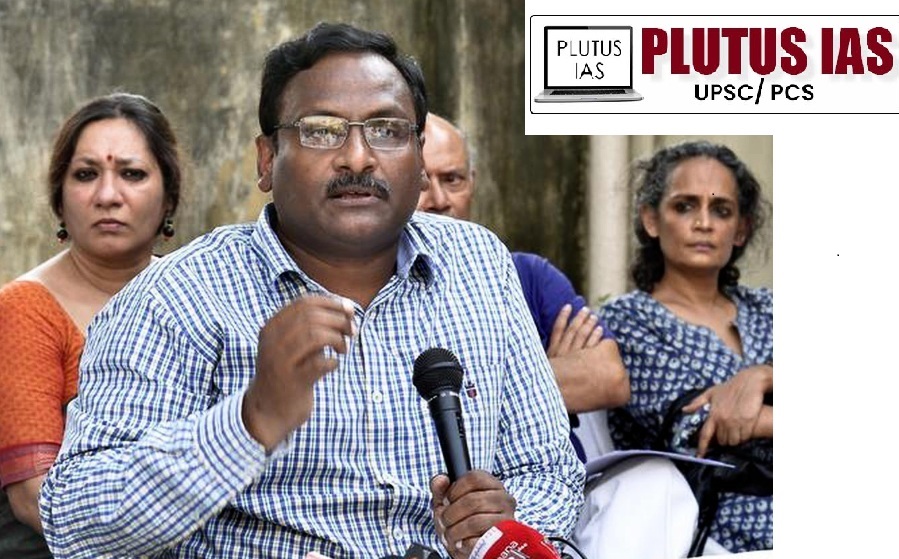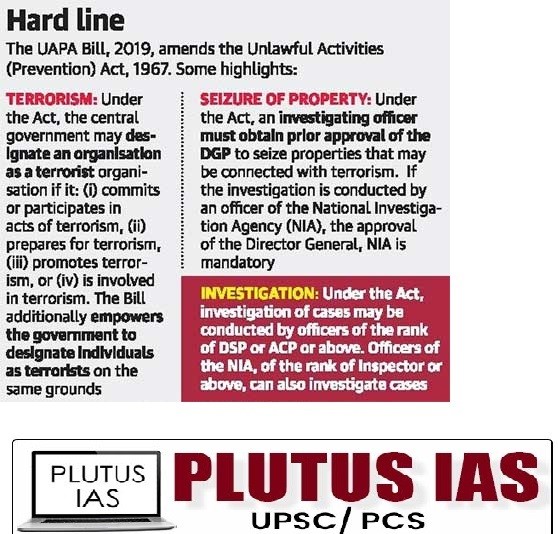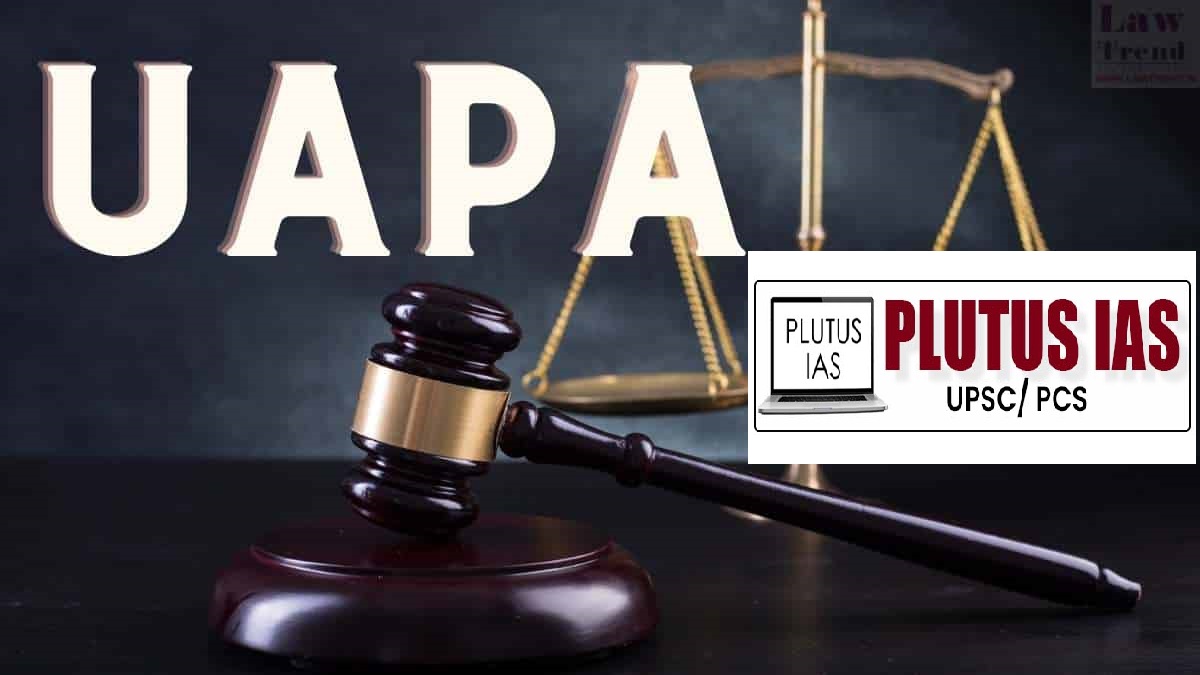07 Mar Unlawful Activities (Prevention) Act (UAPA)
Source – The Hindu and PIB.
General Studies – Indian Politics and Governance, Unlawful Activities (Prevention) Act (UAPA), Unlawful Activities (Prevention) Amendment Bill, 2019, Ministry of Home Affairs, Terrorist Acts, NIA, Human Rights, Restrictions on Fundamental Rights.
Why in the News?

- Recently, on March 5, 2024, the Nagpur bench of the Bombay High Court acquitted former Delhi University professor GN Saibaba in the case of having links with the alleged Maoist organization and also canceled the life sentence imposed on him. Is.
- A division bench of Justice Vinay Joshi and Justice SA Menezes of the Nagpur bench of the Bombay High Court has also acquitted five other accused in the case.
- A division bench of Justice Vinay Joshi and Justice SA Menezes of the Nagpur bench of the Bombay High Court observed that – “It is acquitting all the accused as the prosecution has failed to prove the case against them beyond reasonable doubt “
- The division bench also held as “null and void” the sanction obtained by the prosecution to charge the accused under the provisions of the stringent Unlawful Activities (Prevention) Act (UAPA).
- The prosecution did not ask the Bombay High Court to stay its order, but said it could immediately file an appeal in the Supreme Court.
- On October 14, 2022, another bench of the Bombay High Court had acquitted Saibaba, saying –“The trial proceedings were void in the absence of valid sanction under UAPA.”
- The Maharashtra government filed an appeal in the Supreme Court of India on the same day challenging this decision of the Bombay High Court.
- The Supreme Court of India had initially stayed the order but in April 2023, it quashed the Bombay High Court order and directed a fresh hearing on the appeal filed by Professor Saibaba.
- Professor Saibaba was arrested in 2014. The trial court had convicted all six, including Professor Saibaba and five others, and sentenced five of them to life imprisonment and one to 10 years.
- Professor Saibaba, who was confined to a wheelchair due to his physical disability, has been lodged in Nagpur Central Jail since 2014 after his arrest in this case.
- In 2017, a sessions court in Maharashtra’s Gadchiroli district had also convicted Professor Saibaba, a journalist and others for alleged Maoist links and involvement in activities like waging war against the country. The trial court had convicted him under various provisions of the UAPA law and the Indian Penal Code.
Introduction and objectives of Unlawful Activities (Prevention) Act, 1967 :

The main objective of the Unlawful Activities (Prevention) Act, 1967 was enacted for more effective prevention of certain unlawful activities of individuals and organizations and to deal with terrorist activities and matters connected therewith.
This Act defines the following actions taken by person/s or organizations as illegal activities –
- Any action taken by any person or organization that establishes authority or control over any part of the territory of India.
- Any action taken by any person or organization which subverts the sovereignty of India or threatens the integrity and unity of India.
- Under this Act, the Central Government can declare any guilty organization as a terrorist organization.
- Under this Act, investigation can be conducted by officers of the rank of DSP or ACP or above.
- Unlawful Activities (Prevention) Act Under the , 2019 International Convention for the Suppression of Acts of Nuclear Terrorism (2005) has been added to the list।
Issues related to Unlawful Activities (Prevention) Act 1967 :
- Under this, the period of arrest is extended, which continues to increase further. Before this, normal bail cannot be granted. Also, regular bail is also subject to the satisfaction of the judge.
- In addition to bail, this process also ensures pre-trial, lengthy trials and long periods of imprisonment for accused found guilty of heinous terror crimes.
Reasonable restrictions on fundamental rights of individuals under the Unlawful Activities (Prevention) Act, 1967 in India :

Under the 16th Amendment to the Constitution of India, in 1963, the Parliament of India enacted laws for persons under the Unlawful Activities (Prevention) Act, 1967 has been given the power to impose reasonable restrictions on fundamental rights. In relation to imposing reasonable restrictions on the fundamental rights of individuals, the following restrictions can be imposed –
- Right to freedom of speech and expression.
- The right to assemble peacefully and without arms.
- Right to form a union or organization.
Arrests made so far under the Unlawful Activities (Prevention) Act, 1967 :
- Binayak Sen, a doctor and human rights activist, was arrested in 2007 for allegedly supporting illegal Naxalites.
- Sudhir Dhawale, Dalit rights activist, arrested in 2018.
- Mahesh Raut, tribal rights activist arrested in 2018.
- Varavara Rao, poet, arrested in 2018.
- Surendra Gadling, Dalit and tribal rights lawyer, arrested in 2018.
- Shoma Sen, professor, arrested in 2018.
- Sudha Bhardwaj, tribal rights activist, arrested in 2018.
- Rona Wilson, research scholar, arrested in 2018.
- Gautam Navlakha, journalist and member of the People’s Union for Democratic Rights (PUDR), arrested in 2018.
Amendment to the Unlawful Activities (Prevention) Act, 1967 :

- The Union Cabinet in India has not only amended the NIA Act 2008 but also amended the Unlawful Activities (Prevention) Act, 1967. The Lok Sabha passed the NIA Amendment Act, 2019 on July 15, 2019 and the Rajya Sabha passed it on 17 July 2019.
- By amending Schedule 4 of the Unlawful Activities (Prevention) Act, the NIA has now been given the power to arrest a person only on suspicion of being a terrorist or having links with terrorists.
- Currently only organizations are designated as ‘terrorist organizations’, but under the amendment to UAPA, 1967, now a Person ‘ suspected terrorist’ It can also be said.
Unlawful Activities (Prevention) Amendment Bill, 2019
- Concerned Ministries – Ministry of Home Affairs of India.
- This bill was introduced in the Lok Sabha on July 08, 2019 and it was passed in the Lok Sabha on July 24, 2019.
This bill was passed in the Rajya Sabha on 02 August 2019. - The Unlawful Activities (Prevention) Amendment Bill, 2019 was introduced in the Lok Sabha on July 8, 2019 by Home Minister Shri Amit Shah. The Bill makes the following amendments to the Unlawful Activities (Prevention) Act, 1967, with respect to the procedures for dealing with terrorist activities. Under this Act, the Central Government can declare any organization as a terrorist organization. if He –
- If any person promotes terrorism.
- Otherwise he is involved in terrorist activity.
- He prepares to carry out a terrorist incident.
- the person commits or participates in a terrorist act।
- This Bill also empowers the government to declare any person or persons as terrorists on similar grounds.
- The Act also prohibits the annexation of a part of Indian territory or the secession of a part of the territory of India from the Union. That is, if any person or organization or group of persons tries to occupy any part of India or tries to separate it from India, then legal action will be taken against him under the provisions of this Act. As –Demand for ‘Khalistan’ by Sikhs and formation of an organization called ‘SIMI’ by Muslims.

- Approval to seize property by NIA : Under this Act, an investigating officer is required to obtain the prior approval of the Director General of Police to seize properties linked to terrorism. The Bill states that if the investigation is conducted by an officer of the National Investigation Agency (NIA), the approval of the Director General of NIA will be required to seize such property.
- Investigation by NIA : Under this the Act, the said cases can be investigated by officers of the level of Deputy Superintendent or Assistant Commissioner of Police or above. The Bill additionally empowers NIA officers of the rank of Inspector or above to investigate cases.
- inclusion in the schedule of treaties : This Act defines terrorist acts to include acts committed within the scope of any treaty listed in the Schedule to the Act. Nine treaties are listed in the schedule. These include the Convention for the Suppression of Terrorist Bombings (1997), and the Convention against the Taking of Hostages (1979). The Bill adds another treaty to the list. This is the International Convention for the Suppression of Acts of Nuclear Terrorism (2005).
- The Unlawful Activities (Prevention) Amendment Bill, 2019 makes this law more effective and efficient to deal with unlawful activities and terrorist activities of individuals and organizations and other related matters.
Definition of illegal activity in India :

- Unlawful activity includes “the following acts/activities done by a person or association – by words, writing, actions, signs, any attempt to disrupt or subvert the territorial integrity and sovereignty of India.” To be done.
- “Unlawful activity” means any action taken by a person or association, whether by doing any act or by words, spoken or written, or by means of signs, to question, refute, disrupt or violate the territorial integrity of India. Have intent to disrupt the integrity and sovereignty.
Scope and application of the Unlawful Activities (Prevention) Amendment Bill, 2019 :
- This law is applicable in the entire country.
- Any Indian or foreign national charged under UAPA is liable for punishment under this Act, irrespective of the place where the offense is committed.
- The provisions of this Act also apply to Indian and foreign citizens.
- If a ship or aircraft is registered in India, this law applies to the people on board, irrespective of their country.
Conclusion / Path to solution :

- The above written provisions of this Act show that the Unlawful Activities (Prevention) Act, 1967 was already a very strict/harsh law butBy the Unlawful Activities (Prevention) Amendment Bill, 2019. Recent changes have made this law even more strict/harsh.
- Based on these recent changes, opposition party leaders are concerned that the government may misuse this law to further its own interests and intimidate opposition political parties, as we have seen with the Prevention of Terrorism Act (POTA). Saw in the case of.
- The possibility cannot be ruled out that the government can use this law to suppress the voices of people and institutions opposed to it. Since Parliament has been given the power to impose reasonable restrictions on fundamental rights, this matter becomes very serious.
- Therefore, the government will have to act wisely on this issue so that while maintaining the unity and integrity of the country, the fundamental rights of the individuals can also be protected.
- By the Bombay High Court, former Delhi University professor G.N. The acquittal of Saibaba and five others on charges of having links with Maoists also reflects the practice of imposing stringent laws, such as the Unlawful Activities (Prevention) Act, on an individual merely based on his possible association or sympathy with extremist groups. . Therefore, this Act will have to be used very judiciously and impartially, so that arresting any person merely on the basis of suspicion does not lead to violation and encroachment of the fundamental rights granted to that person by the Constitution of India.
- The Central Government in India should also ensure that the Unlawful Activities (Prevention) Amendment Bill, 2019 will be able to protect the integrity and sovereignty of India.
- The Unlawful Activities (Prevention) Amendment Bill, 2019 should also ensure that it is not misused by the Central Government for its opposition political parties or to intimidate or falsely implicate the workers of opposition parties. Only then can the objectives contained in this Unlawful Activities (Prevention) Amendment Bill, 2019 be ensured and the current relevance of this Amendment Bill can also be maintained.
Practice Questions for Preliminary Exam :
Q.1.Consider the following statements regarding the Unlawful Activities (Prevention) Amendment Bill, 2019.
- This law is applicable only in union states/territories.
- The provisions of this Act apply to both Indian and foreign citizens.
- This bill gives the government the power to declare any person or persons as terrorists.
- Under this Act, an investigating officer is required to obtain the prior approval of the Director General of Police to seize properties linked to terrorism.
Which of the above statement / statements is/are correct?
(A) Only 1 and 3 .
(B) Only 2 and 4.
(C) Only 1, 2 and 3.
(D) Only 2, 3 and 4.
Answer – (D)
Practice Questions for Main Exam :
Q.1. Highlighting the main provisions of the Unlawful Activities (Prevention) Act, 1967, discuss how the misuse of the Unlawful Activities (Prevention) Amendment Bill 2019 violates or encroaches on the fundamental rights of the citizens? Present a logical explanation.
Qualified Preliminary and Main Examination ( Written ) and Shortlisted for Personality Test (INTERVIEW) three times Of UPSC CIVIL SERVICES EXAMINATION in the year of 2017, 2018 and 2020. Shortlisted for Personality Test (INTERVIEW) of 64th and 67th BPSC CIVIL SERVICES.
M. A M. Phil and Ph. D From (SLL & CS) JAWAHARLAL NEHRU UNIVERSITY, NEW DELHI.



No Comments